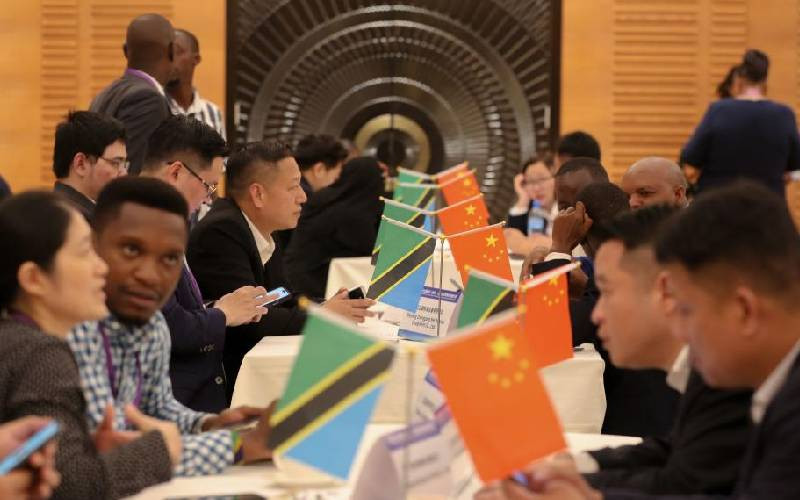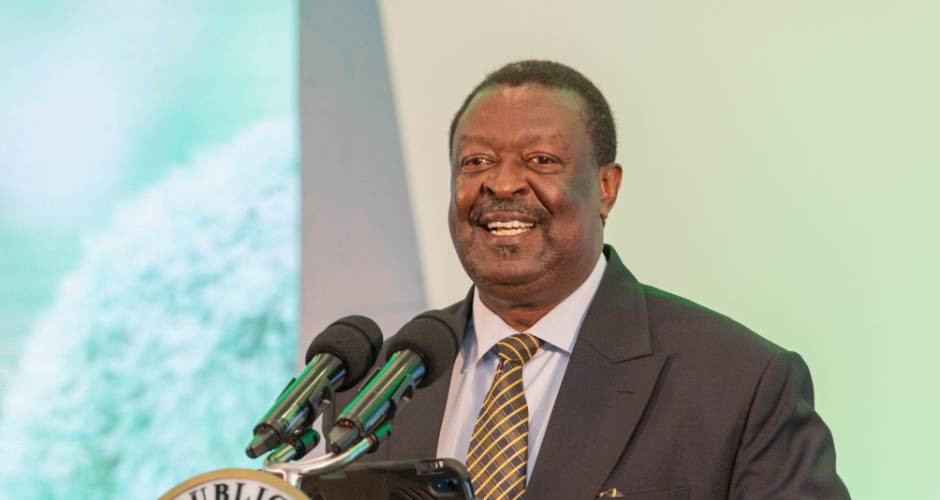 |
|
President Uhuru Kenyatta (centre) with US' Barrack Obama and First Lady Michelle. |
President Obama’s second and final term comes to a close in January 2017, meaning the window of opportunity for both USA companies and Kenya firms to form gainful partnerships and do business, is fast closing.
While the Chinese have been gobbling all the big ticket infrastructure projects, including the eight-lane Nairobi-Thika superhighway, construction of a new terminal at the Jomo Kenyatta International Airport (JKIA), it is their entry into the Sh2 trillion Lamu Port, South Sudan Ethiopia Transport (Lapset) corridor, which must have caught the attention of the West.
A report by Bloomberg Intelligence titled Africa Rising 2014 indicates that multinationals have been increasing their investment in Africa to take advantage of the rising middle class. During the 2003-13, GDP per capita rose 131 per cent in Kenya, ahead of 82 per cent in South Africa.
While telecoms firms are expanding in Africa, this reports states that replicating Safaricom’s success elsewhere could be the game changer for Africa’s wireless carriers.
Wasted opportunities
Kenya is also revising its Gross Domestic Product (GDP) figures, a step that could see its economy expand by 20 per cent, says the Bloomberg report.
Business Beat conducted interviews across business circles, from independent analysts, academicians, policy think tanks and bureaucrats on whether or not Kenya has wasted its opportunities to engage more with the world’s largest economy.
It is still debatable whether Kenya has been able to use the Obama linkage to its advantage in building business and political links with the biggest economy in the world. “Kenya is being treated like any other country that trades with the USA and therefore its trade and political links with the US must be able to compete with other interests elsewhere. Further, if President Obama had visited Kenya in his first term, this could have had negative consequences on his re-election bid,” said Dr Geoffrey Mwau, Economic Secretary, National Treasury.
Upsetting China
Kenya’s nascent oil and gas industry will require a lot of investment and equipment in the coming years, an opportunity that US companies like General Electric could exploit. However, there is a feeling in official circles that the US still has a long way to go before it can upset the Chinese.
Latest figures indicate that China’s trading with Africa has surpassed the US, having conducted a partnership trade worth $200 billion (Sh17.4 trillion) in Africa compared to $80 billion (6.96 trillion) by the USA in 2012.
In Kenya, China is funding a mega railway project at a cost of Sh327 billion and also constructing three first three berths at the yet to be constructed Lamu port, at a cost of Sh42 billion. “The fact that US cars are left handed, not made for Africa and the fact that American goods are more expensive than that of the Chinese, makes it difficult for the USA to upset China in Africa any time soon,” said Dr Mwau.
At the centre of the cold relations between Nairobi and Washington have been the ongoing cases against President Kenyatta and his deputy Ruto at the International Criminal Court (ICC) at The Hague.
Humane approach
“The USA has a clear foreign policy and this is the reason there has been bad blood with the Jubilee administration, whose top leadership is under investigations at the ICC. We, however, need to energise on the recent visit to the US by President Kenyatta.
Stay informed. Subscribe to our newsletter
For instance, we can use the American muscle in the oil and gas sector instead of relying on the Chinese who are mostly profit-driven and less transparent. Americans are more human in their approach, something that we should put into consideration,” said Dr Samwel Nyandemo, a senior economist at the University of Nairobi.
President Obama has less than three years before leaving the Oval office. Has Kenya done enough to take advantage of the heritage and relationship with Obama and the USA to further expand its economic and political clout in East Africa?
“The US Kenya relationship is a singularly important one from the perspective of our national interest,” said Aly Khan Satchu, an independent analyst based in Nairobi.
“It is the US that bought 66 per cent of our Eurobond and has proven that it has the capacity and the will to put skin in the game. It is also an estimated 50 per cent of Inward remittances into Kenya that come from North America, he noted.
“The US is a key counter terrorism partner and I think our relationship had become seriously sub optimal. The US Africa Summit marked the reset of Kenya- USA relations,” said Satchu. “There are many areas that the US corporate sector has been sending a loud demand signal to the Commander in Chief. I think we are on the cusp of an economic surge by the US in Africa,” said Satchu.
He added that the power principle applies in politics hence the need now to follow through on the Washington event and seriously delete and expunge some of the unnecessary and seriously provincial language and behaviour, mentioning that Nairobi has had a really poor etiquette.
In February this year, representatives of large business organisations from the USA were in Kenya to scout for business and investment opportunities. The trade mission to East Africa comprised leading business companies largely from USA and its allies.
Under the umbrella body of Corporate Council on Africa (CCA), a non-profit organisation, the US investors were seeking to promote the commercial opportunities available in the region and foster partnership between African and American companies. The visit by the investors came at a time when Kenya government was aggressively seeking investors from the East mainly China, India, Japan, Asian Tigers countries and Latin American region.
In the past, beginning with the entry of the Kibaki administration, there has been stiff competition for government deals between countries from the East and the industrialised US and European Union nations.
Katrin Kuhlman, a senior advisor to the CCA president in a past interview said American companies are prompted to extend their investment in Kenya based on the latter relationship with the super power. Katrin explained Kenya is endowed with hospitable population and is located strategically in the East Africa region.
Fostering partnerships
Further she added, Kenya is the economic leader and host most of the global institutions. “We are interested to extend our investments in Kenya with the view to promoting the commercial opportunities available in the region and foster partnership between African and American companies,” said Katrin.
The list of US firms that have been seeking for opportunities in Kenya include Acro Bridegs, Bizsolutions 360 Inc, Oxford business group, General Electric, Axum Energy Ventures, Cross Boundary LLC, Fayus Inc, and Seafarer International among others.
American investors are eyeing a piece of Kenya’s agricultural sector, especially value addition of crops such as coffee, tea, pyrethrum, sugar, livestock and sugar.
“Kenya’s textile industry is picking up momentum after failing to satisfy the Agoa market for some time now. We need to have a trickle-down effect of this trade instrument, including not only creating jobs but also moving down stream to the ginneries and farmers who can in future supply cotton directly to the export processing zones,” said Anthony Muriithi, acting chief executive, Cotton Development Corporation (CDC).
Kenya is hoping to ride on the Agoa protocol to increase its penetration of the American market. “While the cold war has come to an end, it has actually changed face to commercial competition with recent discoveries of oil, gas and coal in parts of Eastern Africa has changed relations between USA and Africa,” said Gerrishon Ikiara, University of Nairobi economics lecturer.
Figures from US Trade representative, paint a gloomy picture of the US-Kenya relationship, complete with wasted opportunities. Kenya is ranked the US’s 96th largest goods trading partner with $1.1 billion (Sh88 billion) in total (two way) goods trade during 2013.
Exports totalled $651 million (Sh57 billion) while imports totaled $451 million (Sh40 billion). The US goods trade surplus with Kenya was $201 million (Sh 19 billion) last year.
The super power’s goods exports to Kenya in 2013 were valued at $651 million (Sh56.637 billion), up 14.5 per cent ($83 million -Sh7.221 billion) from 2012, and up 232 per cent from 2003. The top export categories for 2013 were aircraft ($217 million), machinery ($104 million), optic and medical instruments ($45 million), electrical machinery ($37 million), and cereals (grains and sorghum) ($26 million).
US exports of agricultural products to Kenya totaled $81 million in 2013. Leading categories were coarse grains ($22 million) and vegetable oil (excluding soybeans) ($15 million). Kenya was the United States’ 92nd largest supplier of goods imports in 2013. US goods imports from Kenya totalled $451 million in 2013, a 15.7 per cent increase ($61 million) from 2012, and up 81per cent from 2003.
The five largest import categories in 2013 were knit Apparel ($160 million), woven apparel ($148 million), spices, coffee, tea and coffee ($39 million), edible fruit and nuts (macadamia nuts) ($29 million), and electrical machinery ($22 million).
US imports of agricultural products from Kenya totalled $90 million in 2013. Leading categories include coffee (unroasted) ($33 million), and tree nuts ($30 million). The US goods trade surplus with Kenya was $201 million in 2013, a 11.9 per cent increase ($21 million) over 2012.
While trade has been up been Kenya and the USA, it is figures on US foreign direct investment into Kenya that gives a different narrative. For instance, US foreign direct investment into Kenya was $259 million (Sh23 billion) in 2012, down 33.6 per cent from 2011.
Virgin opportunities
The Jubilee administration has named Kenya’s top three infrastructure priorities to include doubling the country’s road network, expanding its rail sector and completing a second container terminal at the Indian Ocean port of Mombasa - the biggest in east Africa and the region’s trade gateway.
There is the second port in Lamu, north of Mombasa - part of a $25.5 billion (2.218 trillion) regional infrastructure project aiming to link landlocked east African nations to the sea - as well as a new passenger airline terminal in Nairobi.
 The Standard Group Plc is a
multi-media organization with investments in media platforms spanning newspaper
print operations, television, radio broadcasting, digital and online services. The
Standard Group is recognized as a leading multi-media house in Kenya with a key
influence in matters of national and international interest.
The Standard Group Plc is a
multi-media organization with investments in media platforms spanning newspaper
print operations, television, radio broadcasting, digital and online services. The
Standard Group is recognized as a leading multi-media house in Kenya with a key
influence in matters of national and international interest.
 The Standard Group Plc is a
multi-media organization with investments in media platforms spanning newspaper
print operations, television, radio broadcasting, digital and online services. The
Standard Group is recognized as a leading multi-media house in Kenya with a key
influence in matters of national and international interest.
The Standard Group Plc is a
multi-media organization with investments in media platforms spanning newspaper
print operations, television, radio broadcasting, digital and online services. The
Standard Group is recognized as a leading multi-media house in Kenya with a key
influence in matters of national and international interest.









